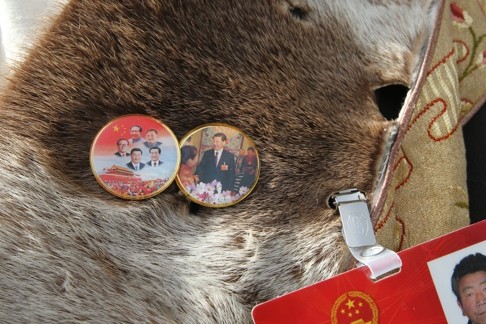With the annual “Two Sessions” political assemblies underway in Beijing, the South China Morning Post’s Nectar Gan and Jun Mai report on accessories worn by Tibetan delegates to the top political meetings:
Pinned over their hearts were two badges: one of Xi and the other of Xi and his four predecessors.
A Tibetan delegate to the Chinese People’s Political Consultative Conference said the badges were given to him last year on the 50th anniversary of Tibetan government.
When asked why he was wearing them, he smiled, patted the badges and said: “Because we believe in it.”
[…] Pointing to the badge of a smiling Xi, he said: “The photo was taken when President Xi met us Tibetan delegates, maybe two years ago.”
[…] Staff with the Tibetan delegation also wore the Xi badges and several stressed they were wearing them “out of their own free will”.
One staff member said it was the first time the Tibetan delegation had worn badges to the congress. […] [Source]
Continuing tensions over Beijing’s policies in Tibetan regions of China were highlighted last week when a Tibetan monk in Sichuan province died after self-immolating, becoming the 144th Tibetan to commit a similar act of protest since 2009, and the first of 2016. A Tibetan teenager in India also died last week after self-immolating “for his country.” Last month a Tibetan writer and blogger was jailed for “inciting separatism” and “endangering social stability.” Last weekend, Amnesty International released a call to action for a Tibetan woman in detention for moving the body of a self-immolator in 2013, who they believe may soon be subjected to an unnecessary medical operation against her will. In a Global Times article on the recent self-immolations, the nationalist tabloid stated, “The region, under the leadership of the Communist Party of China, has become prosperous and enjoyed ethnic unity after the toppling of the feudal serfdom under theocratic rule. At the ongoing two sessions, most delegates from Tibet present at the conferences wore pins with a Chinese flag and the busts of five Chinese leaders from Mao Zedong to Xi Jinping, which they said is a spontaneous act to show gratitude to the leadership.”
After the Dalai Lama in 2014 praised Xi Jinping as “more open-minded” than previous Chinese leaders and hinted that he was in informal dialogue with Beijing over a pilgrimage to Wutai Shan, Chinese authorities quickly dispelled rumors that long sour relations with him may be thawing. Last year, the Dalai Lama repeatedly suggested that he could be the last incarnation of the politically-charged tulku, and Beijing insisted that it will have a hand in naming the aging spiritual leader’s successor.
At Global Voices, Oiwan Lam reports on initial WeChat coverage of the badges “voluntarily” worn by the Tibetan delegates in Beijing, and the short-lived netizen commentary that followed:
With little opportunity for direct political participation, Chinese Internet users make sport of dissecting and often mocking statements by legislators at the annual conference. This year, attention is focused on pins bearing Chinese President Xi Jinping’s image that appeared on the chests of Tibetan delegates. Many Internet users say the pins remind them of the leader-worship culture that plagued China during the Cultural Revolution, from 1966 until 1976, when Mao Zedong attempted to consolidate his power and sideline “revisionists” within the party.
Qin Feng, a reporter for Hong Kong Star TV, spotted the Tibetan delegates wearing two pins on their chests when they were entering Congress Hall. […]
Qin Feng uploaded the photos to her public account on WeChat, where they soon spread to other social media platforms, becoming a viral sensation within a few hours.
Before long, the reporter’s WeChat account was blocked and the term “Xi’s pin” became unsearchable on Sina Weibo. [Source]
The Global Voices post continues to translate several netizen comments from a CDT Chinese post archiving discussion of the topic. On Twitter, Reuters’ Megha Rajagopalan noted that she was encouraged to wear a badge featuring another controversial geopolitical topic while covering the political meetings:
Hainan delegation staff tried to pin it on me and take my photo and I had to politely decline because #objectivity #NPC
— Megha Rajagopalan (@meghara) March 7, 2016
Recently, Beijing announced plans for a second railway connecting Lhasa to the rest of China. The first line to Lhasa, known as the Qinghai-Tibet Railway, opened in 2006 amid concerns that subsequent Han immigration could pose a threat to Tibetan culture, and that construction and use could have a significant environmental impact. At the political meetings in Beijing, the vice Party secretary of Tibet attempted to assuage similar concerns over the new line, which will connect Lhasa to Chengdu:
“The ecological environment of Tibet will not be harmed,” Padma Choling, the vice party
secretary of Tibet, told reporters on the sidelines of the annual parliament meeting.
“The railway will be well built under the condition of environmental protection. That is for sure. You can’t just say, ‘Don’t build it’.”
[…] Exiled Tibetans and rights groups also say the first railway has spurred an influx of long-term migrants who threaten Tibetans’ cultural integrity, tied to Buddhist beliefs and a traditional herding lifestyle.
Chinese officials say the new railway link will bring development to Tibet and the government consistently denies any rights abuses or cultural disrespect there. [Source]
Environmental protection is expected to be a primary focus of the 13th Five Year Plan, which will be announced as the top political meetings come to a close in Beijing this week.








